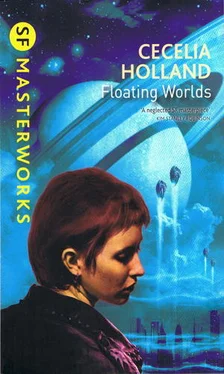“ Ybicsa ,” the radio said urgently, “you’re coming in too fast. Please do not race. You’ll stall—”
“Turn that off,” Saba said, and Tanuojin leaned back and shut the volume down; she could still hear the tiny voice complaining behind her.
Ybicsa glided smoothly as a dream through the series of short jogs. Paula held herself in place, her hands on the harness. After the free fall she felt heavy and dull in the gravity.
“One-four,” Tanuojin read. “Three-sixteen. Saba, you could fly a piece of silk. One-eight, one-eight.”
She raised her heavy head like a bulb on her neck. Ybicsa crept through the utter dark. Paula blotted out Tanuojin’s voice reading their speed. They hardly seemed to move. Then light flashed on ice, and Ybicsa burst up through the surface of the water and shot through the city, and Paula jumped, startled.
Tanuojin sat down again behind her. The ship settled, turning a slow corkscrew. Saturn-Keda flew past the window, striped with bushy green foliage. It was dark, like twilight. She looked down through the window over her head into streets lined with little square buildings. She was too high above them to make out the people save as a coiling swarm in the street. Ybicsa rolled slowly over, and the city curled around her, covering the inside surface of the bubble. They passed beneath an inky river stitched over with bridges. Abruptly Ybicsa was swallowed.
Paula gave a violent start. But they had only flown into a dock. The engines roared. She was sliding forward into the harness. The ship slowed around a curve. A string of other ships was parked along the inside wall of the dock. Saba eased the ship up to an empty platform. Something thudded against the outside of the hull under her feet: maybe an anchor. She pulled off her gloves. Tanuojin climbed past her and thrust the hatch up and out. The ship rocked slightly under his step. She struggled with the clips of her harness. Saba leaned down to help her.
“Remember, no talk.” He unplugged her suit and fastened the veil across her face. She clambered after him out the hatch. The suit was heavy as chain over her shoulders. She could barely stand upright.
The platform was bare and cold. The wall was papered over with torn posters. The veil closed off her side vision. Tanuojin stood talking to a big graying man. The sleeves and front of his shirt were embroidered in metallic thread. He swung around, looking over her head.
“Saba, why do I spend a fortune training pilots?” They shook hands.
“Your pilots don’t fly my ships.”
Another man brought a board and a stylus up to him. “Akellar, I need your full engine rates—” Saba took him off to the stern of his ship.
The old man looked down at Paula. “Who is she?”
“Saba’s latest moral aberration,” Tanuojin said.
She glanced up at him, and the old man laughed. He smacked Tanuojin on the back with his open hand. “Tajin, you’ve made yet another enemy. Let’s go, it’s cold.”
They took off the black pressure suits in a locker room near the platform and went down a stair to the inner surface of the bubble. The three men talked about people she had never heard of. They walked along a street crowded with Styths. She had to trot to keep up with Saba. The buildings on either side were one and two stories, plain stone houses. Strips of green separated them: the grass that helped circulate the air. It even grew on the roofs of some houses. The buildings, the people around her, everything dwarfed her. She felt shrunk to miniature, like a toy. They went down a huge step in the street. She took Saba’s hand to negotiate it. In the twilight, the street ran straight off before her to the curve of the bubble in the distance, ran up the side, and turned and came back over her head. When she looked straight up she could see the busy streets and buildings of the other side of Saturn-Keda, two or three miles over her head, upside down. A strong odor of fish reached her nose. She looked around at the sheets of nets hanging from the eaves of the houses they passed. The street glistened with fish scales. A furry brown beast, cat-sized, was eating something in the gutter.
They went through an open gate into a yard. Three children were chasing each other around at the far end. Their heads were bald as onions. Paula’s arms and legs ached with fatigue. Her face sagged. Saba took her hand and helped her up three high steps. They went into a blue hall.
“Here.” Saba planted her firmly in the middle of the room. “Stay here. Melleno, let me use your photo-relay.”
Melleno took him out of the room. Paula looked around her. The blue light rippled through the room, constantly changing color. It was like being under water. This was what Matuko would be like, dark and cold. There was no ceiling: she looked up across Saturn-Keda, into the distant web of streets. Tanuojin was at the far end of the room, ignoring her. Melleno came back.
“Well? Tell me about the Middle Planets.”
“You’re right,” Tanuojin said. “It’s a lot more complicated than we thought.”
“Tajin. Tell me something new.”
She went to the table against the wall. It was strange to walk. Even the crepe dress felt heavy. The table was Styth-sized and her chin just cleared the top. A bowl stood on it heaped up with little red beans, or perhaps fruit.
“The Martians have the guns and the money,” Tanuojin was saying, “but the anarchists do all the thinking.”
“Where did he get her?”
“On the Earth.”
“Is she an anarchist?”
“Melleno, she is a pig. You know how he is about women.”
Her back was to them. She pulled the veil aside. He had been enraged, in Ybicsa , because he had had to help her. She took a handful of the beans out of the bowl and put one in her mouth. It was soft and sweet with a hard pip in the center.
“What do you think of Saba’s treaty?”
“I like the economics. That’s a lot of money. What about this truce?”
“It’s just with the Council, not with the Martians.”
“Is there a difference?”
She went along the wall to a window. The sill was a foot wide. She stood eating the fruit. The Styth children were playing before her in the yard. They were bigger than she was. They looked very young, their cheeks still round, like babies’. Now the air in the room was green. She took a seed out of her mouth and flicked it out to the courtyard. Maybe it would grow: her mark on Saturn-Keda.
“Can we take them?” Melleno asked.
“Yes, we can take them. We have to think of how, that’s all, but there’s a way. You used to tell me we could take anybody. Don’t you believe it any more?”
“Well, an old man sees short. What do you want to drink?”
“Nothing. Water.”
Melleno’s voice softened with amusement, even affection. “You know, Tajin, if you allowed yourself the occasional vice, you might find life more pleasant.”
“Why is it such a crime not to get drunk?”
Paula leaned on the window sill. A woman had come out of a door nearby. Her hair was piled up on her head; her fringed sleeves hung down almost to the ground. She called angrily to the children to stop screaming.
Behind Paula Saba came into the room. She yanked the veil across her face again. He went up to the other men, and Tanuojin slung one arm around his neck.
“I feel as if I’m going to put my foot through the floor.”
“What was the Earth like?” Melleno said.
Saba raised his head. “Beautiful. Even the natural parts, outside the cities. Every place you look there’s something you’ve never seen before. They don’t just have two or three kinds of trees, they have hundreds. They have insects there that look like flowers and flowers as high as your head. And the strangest people I’ve ever met.”
Читать дальше











